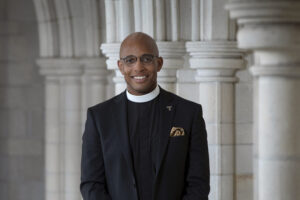 There is a word from the Bantu family of languages in Africa that I find meaningful: Ubuntu. It is sometimes translated as “I am because you are.” It signals not only a deep universal connection to all human beings, but also an awareness that I cannot know myself if I am unwilling to know you.
There is a word from the Bantu family of languages in Africa that I find meaningful: Ubuntu. It is sometimes translated as “I am because you are.” It signals not only a deep universal connection to all human beings, but also an awareness that I cannot know myself if I am unwilling to know you.
The renowned Archbishop Desmond Tutu, famous for his truth and reconciliation work in post-apartheid South Africa, says this about Ubuntu:
“One of the sayings in our country is Ubuntu — the essence of being human. Ubuntu speaks particularly about the fact that you can’t exist as a human being in isolation. It speaks about our interconnectedness… We think of ourselves far too frequently as just individuals, separated from one another, whereas you are connected and what you do affects the whole world. When you do well, it spreads out; it is for the whole of humanity.”
Our differences can, and far too often do, divide us. Someone from a different religion, part of the globe, or political perspective can trigger the “fight or flight” part of the brain that causes us to treat them as enemies simply because we are different. The beautiful thing about a diverse community–not unlike a college–is each individual provides another opportunity for us to know ourselves more deeply by endeavoring to know them as they are, not as we wish them to be. Diversity presents us with a challenge. Living in a community filled with different kinds of people can be hard, especially when the other holds a moral commitment, worldview, or belief system that is not only different than ours, but potentially inimical. It is hard particularly because it de-centers us and our perspectives and forces us to make room for another.
In the Christian scriptures, Jesus of Nazareth, midrashing his beloved Jewish scriptures, adds “love your enemies” to the Torah’s immortal list of love–self, God, neighbor, and stranger–suggesting that no one whatsoever should be beyond our circle of care and concern. The wisdom of the Torah teaches us that love is not primarily theoretical. It is particular and actionable. Love is about bringing someone else into our circle of care and concern and treating them as honored guests (whether or not we think they deserve it). At its heart, love is a posture of hospitality, and hospitality, whether in hospitals or the hospitality industry (restaurants), is all about serving others.
My husband and I hosted Thanksgiving for my family a few years ago. I learned quickly that true hospitality requires us to center guests’ needs and desires rather than compelling them to take what we think they need. To do this well, we must endeavor to know and understand our guests: their likes and dislikes, allergies, and preferences. It requires that we make physical and emotional space for the other to simply be. We practice this a lot in the Office of Spiritual and Religious Life. When we provide Kosher or Halal food at an interfaith dinner for example, regardless of whether or not we hold such practices, we signal to others that we see them and that they are welcome to be here with us. Much of the violence, intolerance, and even hate that permeates our society and world are rooted in an inability to see and make room for another. Words can become weapons when we don’t use them to engage others thoughtfully and with compassion for differing interpretations and perspectives, when we aren’t willing to receive them as much as we give them. Cynicism takes root when our hearts are not open to the inherent goodness in others and when we refuse to meet them where they are and seek to know them as they are.
To be clear, serving others is primarily about them. It is dangerous to reduce others to mere tools for our self-discovery. And yet, as we humbly serve others, welcome them, and draw them into our ever-growing circle of care and concern, we learn about ourselves and discover who we are beneath the veneer we present to the world. Commitments that we once held sacrosanct begin to slacken while others concretize. We begin to release what were once ironclad prejudices by learning vulnerability and curiosity instead. We also learn humility because the work of building a diverse and beloved community is difficult and inevitably results in mistakes and missteps. Hopefully, what we discover in ourselves, we discover in another and, in so doing, forge enduring connections that transcend any differences of identity, experience, or perspective.
As we close the semester, I invite you to consider how you have come to know yourself more by seeking to know, understand, and serve others. What commitments have you learned to hold more loosely? Which commitments have become more salient? Which person or people have you drawn closer into your circle of concern? Who might be missing? What does this tell us about ourselves and our work to build a more loving and just society?
In the Tao Te Ching, Chinese philosopher Lao Tzu reminds us that “to know others is intelligence, but to know ourselves is wisdom.” Each of us is on a journey of self-discovery. May we each take each opportunity to deepen this journey by making a profound commitment to truly loving one another.
